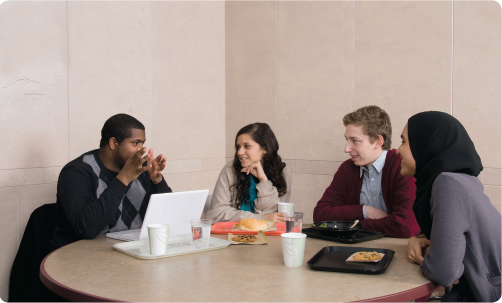Understanding Diversity and the Source of Our Beliefs
diversity Variations in social and cultural identities among people living together.
multiculturalism The active process of acknowledging and respecting the diverse social groups, cultures, religions, races, ethnicities, attitudes, and opinions within a community.
Diversity is the variation in social and cultural identities among people living together. Multiculturalism is the active process of acknowledging and respecting social groups, cultures, religions, races, ethnicities, attitudes, and opinions. As your journey through higher education unfolds, you will find yourself immersed in this mixture of identities. Regardless of the size of the institution, going to college brings together people who have differing backgrounds and experiences but similar goals and aspirations. Each person brings to campus a unique combination of life story, upbringing, value system, view of the world, and set of judgments. Familiarizing yourself with such differences can greatly enhance your experiences in the classes you will take, the organizations you will join, and the relationships you will cultivate. For many students, college is the first time they have been exposed to so much diversity. Learning experiences and challenges await you both in and outside the classroom. College provides opportunities to learn not only about others but also about yourself.
Many of our beliefs grow out of personal experience and reinforcement. If you have had a negative experience or endured a series of incidents involving members of a particular group, you’re more likely to develop stereotypes, or negative judgments, about people in that group than if you haven’t had such experiences. Or maybe you have heard repeatedly that everyone associated with a particular group behaves in a certain way, and you might have bought into that stereotype without even thinking about it. Children who grow up in an environment in which dislike and distrust of certain types of people are openly expressed might agree with those very judgments even if they have had no direct interaction with those being judged.
stereotype An oversimplified set of assumptions about another person or group.
YOUR TURN
Think About It
Think back to the earliest messages you received from family members about how you should react to people who are different from you. Which messages still affect your behavior? Which messages have you revised?
In college you might encounter beliefs about diversity that run counter to your basic values. When your friendships with others are affected by differing values, tolerance is generally a good goal. Talking about diversity with someone else whose beliefs seem to conflict with your own can be very rewarding. Your goal in this kind of discussion is not to reach agreement, but to enhance your understanding of why people see diversity differently, why some seem to flee from it but others allow experiences with diversity to enrich their college experience.
Before coming to college, you might never have coexisted with most of the groups you now see on campus. Your home community might not have been very diverse, although possibly it seemed so before you reached campus. In college you have the opportunity to learn from many kinds of people. From your roommate in the residence hall to your lab partner in your biology class to the members of your sociology study group, your college experience will be enriched if you allow yourself to be open to the possibility of learning from members of all cultural groups.
When you think about diversity, you might first think of differences in race or ethnicity. Although it is true that those are two forms of diversity, you will most likely experience many other types of diversity in college and in the workplace, including age, religion, physical ability, learning ability, sexual orientation, gender, and economic status.
